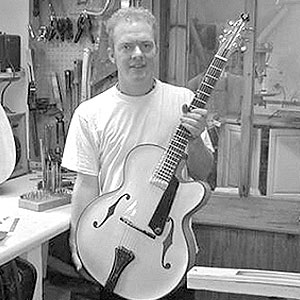| In Memoriam: François Pistorius November 10, 1969 — June 23, 2002 |
|
| Born in Pretoria, South Africa, François Pistorius spent his childhood in the town of Bethlehem in the Eastern Free State. He attended high school in Pretoria and was interested in the creative arts, including pottery and sculpture. — Rodney Stedall I thought the world of Fran’s instruments and was certain that he would be one of the great luthiers of this century. Now all I have to remember him by is a 000, an archtop, and a 12-string. — Stuart Deutsch I will never own one of François’ instruments, and for that I will forever be at a loss. I did not meet him, but on the phone he was articulate, insightful, and gracious. I did, however, play several of his instruments and knew that I had to have one. They are truly remarkable in every way. The line between art and craftsmanship is fine and difficult to tread. To produce something practical, superbly made, and with a higher aesthetic is to create something for the ages. François has left us with far too few instruments, but no doubt, they are for the ages. — Larry Baeder One of the highlights of my time with Guitar Talk was the article that I did on François Pistorius. His workshop was amazing and very organized. He tapped some wood for me so I could hear the difference between a good piece and one that would not perhaps make such a good guitar. His life story was fascinating to hear while I saw the many different instruments in his workshop. I was fortunate to hear his band rehearsing at his cottage in the country east of Pretoria, and also hear him play his double-neck guitar/bouzouki at a Tárrega club meeting. I was very impressed with his music, which was mainly Celtic in style. I feel very fortunate to have met him. Having known him, even very briefly, has added more color to my life. In the words of his friend Irma Wouters, “He’s making harps for the angels now.” — Anne Ludwig |
Top of Page |

